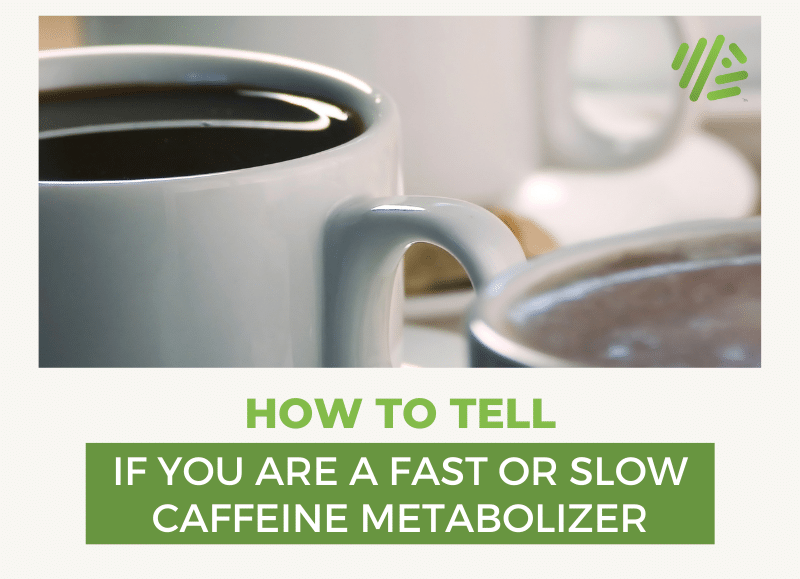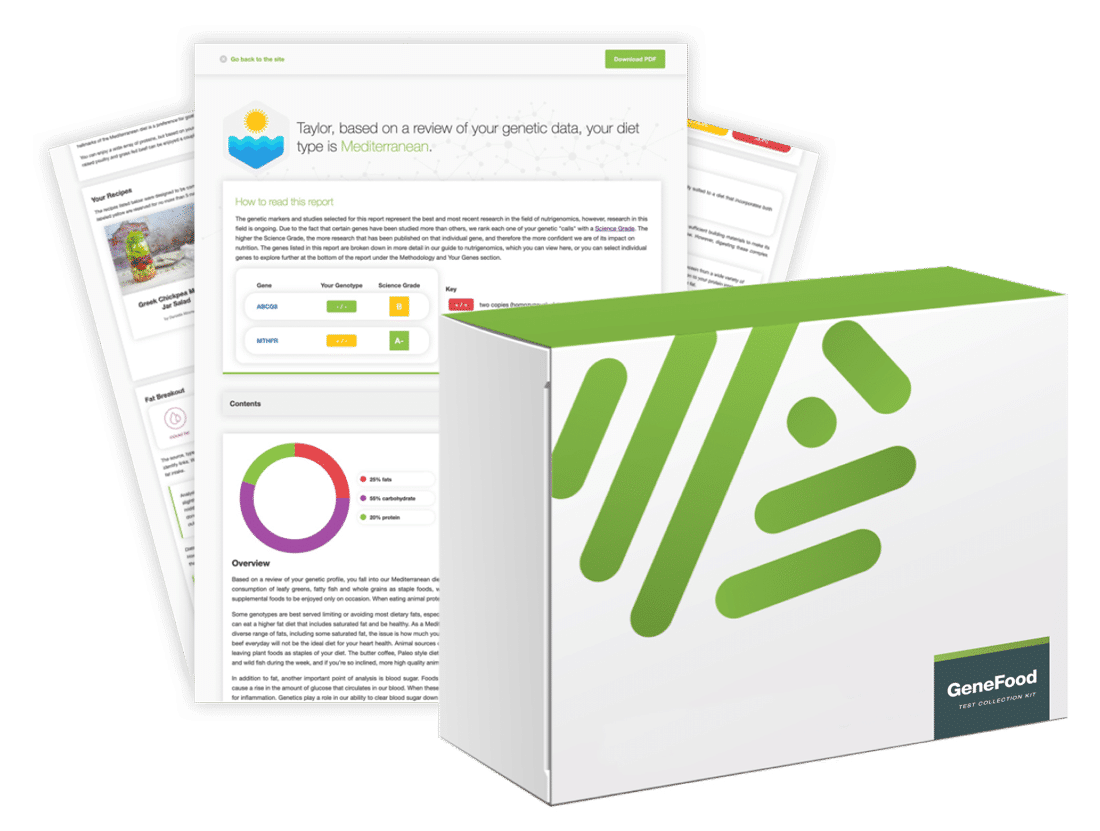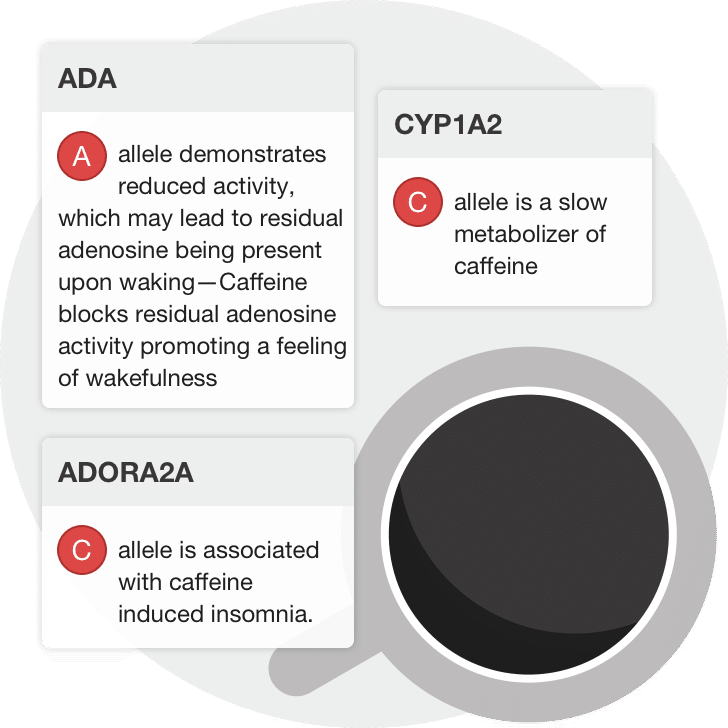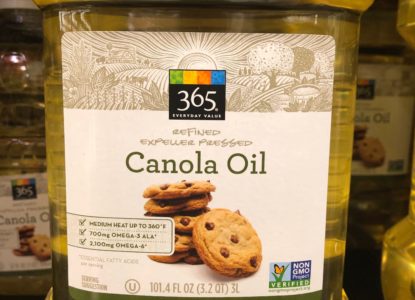How to Tell if You Are a Fast or Slow Caffeine Metabolizer
Article at a Glance
- Coffee, drunk in moderation, can have many health benefits.
- However, not everyone metabolizes caffeine at the same rate. Certain variants in the CYP1A2 genes are associated with slower caffeine metabolism.
- If your caffeine metabolism is slowed, the caffeine you drink in the morning may still be active well into the night when you are trying to sleep.
- Caffeine binds to and blocks the sleep receptors in the brain and, while active, makes it harder for us to sleep, especially those of us who metabolize caffeine more slowly.
- Slow caffeine metabolizers may also be at an increased risk for high blood pressure and heart disease when drinking multiple cups of coffee a day.
Genes Mentioned

Contents
Ever wonder why some of us can drink an espresso right before bed and still get our 8 hours, while others will be staring at the ceiling all night? The answer lies in our genetics. Let’s have a look at the genes that drive differences in caffeine metabolism.
To say coffee is popular is quite the understatement. Ninety percent of Americans drink some form of caffeinated beverage every morning.
And while, the coffee culture in the United States is ubiquitous, people respond differently to caffeine based, in part, based on genetics.
When we drink caffeine, enzymes in the body break the drug down and get it out of our system. But not everyone is born with the same enzyme activity for metabolizing caffeine. Some of us get rid of it fast, others, who have less enzyme activity, much slower.
Variants in a gene called CYP1A2 determine how fast your liver metabolizes caffeine. 1 Your CYP1A2 status determines how fast your body will clear the caffeine you drink. Slow metabolizers are more likely to have caffeine induced anxiety, sleep problems, and even high blood pressure as a result of having that morning cup of coffee.
By contrast, some of us are fast metabolizers of caffeine. The speed with which we break down caffeine determines the half life of the drug in our system. The half life of a drug like caffeine is the amount of time the drug is active before it is fully metabolized by the body. For those who carry the CYP1A2 gene associated with slower caffeine clearance, caffeine has a much bigger impact than it might on someone who carries a different variant of the gene.
In the standard western diet, coffee, which is chock full of polyphenols, is actually one of the primary sources of antioxidants for many Americans. And drinking coffee in moderation can be very healthy if you have the right genes.
How caffeine metabolism impacts heart health
Genetic studies looking at how caffeine consumption can impact heart health are mixed, with some showing no increased risk for slow caffeine metabolizers, and others flashing warning signs.
One of the latest studies to look at the issue of caffeine consumption and genetics, which was published in the American Journal of Clinical Nutrition, found no increased risk for CYP1A2 genotypes when consuming moderate amounts of coffee.
In fact, the authors found that drinking moderate amounts of coffee was probably good for your heart. But be warned, they do say that drinking more than 5-6 cups of coffee per day is probably a bad idea and might play a role in increasing your risk for heart disease by as much as 22 percent.
One thing I find funny about the study is setting the upper limit of 5-6 cups as “healthy.” That’s a ton of caffeine! Depending on strength of the coffee, 5 cups in a day is close to, or above, 1 gram of caffeine, which has been described in the medical literature as the threshold when very severe side effects can develop.
To quote this old paper published by the military:
Extreme side effects were observed in humans at caffeine intakes of 1 g (15 mg/kg) (Gilman et al., 1990), including restlessness, nervousness, and irritability, and progressing to delirium, emesis, neuromuscular tremors, and convulsions. Other symptoms included tachycardia and increased respiration.
This study from the American Journal of Clinical Nutrition represents a departure from some others which found that high caffeine consumption and CYP1A2 do not mix. These studies found an increased risk of myocardial infarction (heart attack) and high blood pressure in slow metabolizers of caffeine. 2 3
This study from the Journal Hypertension, which looked at 553 individuals over 8.5 years, found that caffeine drinkers with slow CYP1A2 metabolism were much more likely to develop hypertension than fast metabolizers.
This study from the Journal Genes and Nutrition found that slow caffeine metabolizers were more likely to have heart attacks as a result of drinking caffeine. In slow metabolizers drinking 3-4 cups a day of coffee caused a significant increased risk of heart attack that wasn’t seen in rapid metabolizers. Notably, this study was conducted in subjects under the age of 50.
Want to find out your caffeine metabolism status? We report on caffeine metabolism in our custom nutrition plan product.

Get Started With Personalized Nutrition
Gene Food uses a proprietary algorithm to divide people into one of twenty diet types based on genetics. We score for cholesterol and sterol hyperabsorption, MTHFR status, histamine clearance, carbohydrate tolerance, and more. Where do you fit?
Coffee half life and sleep duration
Think of this: we know caffeine has a half life, usually of about 5-6 hours, but this number varies a great deal based on genetics.
Let’s say I have a patient who I know is a slow metabolizer. It’s likely their morning cup of coffee has a half life of 7-9 hours. So, if they have 2 cups in the morning, then a decaf or two later in the day, how will that impact their sleep? When they want to get sleep later that night, the caffeine is still very active in their system.
Why?
Because it’s not just the half life, caffeine has a quarter life, meaning it’s still has its hooks in my patient long after that morning sip. According to sleep scientist Matthew Walker, author of Why We Sleep, caffeine’s quarter life is about double its half life. This means that slow metabolizers like my patient may still be feeling the effects of their morning coffee well into the night. No wonder caffeine has been shown to be so disruptive of sleep. 4 After all, it binds to and blocks our adenosine receptors, the signaling pathways the body uses to fall asleep each night.
Granted, one morning coffee may not be packing enough of a punch to keep most (some?) people awake all night, but that’s not what we are talking about, we are talking about disrupted sleep patterns. The biggest issue for many of us when it comes to caffeine consumption is sleep.
So, in a nutshell, caffeine can be a bad idea for slow metabolizers, not only because it has the potential to increase the risk for a cardiovascular event, but because it can badly disrupt sleep.
Caffeine genetics overview
While the CYP1A2 gene gets most of the attention, it is not the only genetic variant that factors in to personalizing coffee and caffeine consumption. As the chart below summarizes, other markers, such as ADA and ADORA2A play a role in how caffeine affects us.

The bottom line
The bottom line is that we know with 100% certainty that people metabolize caffeine at different rates based on genetics. If you are a slow metabolizer, it is likely best to keep a closer eye on how drinking coffee affects your blood pressure and sleep.
See also: Is Coffee Good or Bad for the Gut?

Get Started With Personalized Nutrition
Gene Food uses a proprietary algorithm to divide people into one of twenty diet types based on genetics. We score for cholesterol and sterol hyperabsorption, MTHFR status, histamine clearance, carbohydrate tolerance, and more. Where do you fit?




I hope you write more about coffee qua histamine liberator. I googled it, but didn’t get informative results.
I know, this is a tough one. It gets thrown around a lot that coffee is a histamine liberator, but there seems to be a lack of hard data to prove it. This is why I threw it in, but said “rumored to be” a histamine liberator. This study in rats appears to be the best one out there and shows that caffeine is a fairly potent histamine liberator in animal models: https://www.ncbi.nlm.nih.gov/pubmed/25031227
Coffee is the canary in the coal mine. Following a day of eating foods I knew from experience to cause histamine issues for me, such as unrefined coconut oil or white vinegar, (which sometimes might not even trigger any discernible sxs at the time of consumption) my morning coffee would almost immediately provoke itching over most of my upper torso. Coffee seems to metaphorically bump the full histamine bucket.
Mark, what a great comment. For many of us, and probably the majority of us, the greatest benefit from caffeine comes by staggering doses. I am 100% with you. Your weekend strategy sounds great. I am reserving my coffee days for every so often on the weekend and on the days I record the podcast as I love getting the old “kick” that I used to get when first drinking coffee. At the end of the day, why even drink caffeine every day if the benefits are no longer there? Like you I only get real benefit from coffee when I drink it once or twice a week. Would rather have that one Superman day than 7 straight maintenance days. I also find that once I am detoxed, the occasional decaf espresso from a nice coffee shop is good for the weekdays.
John, you gave me a great idea. Just ordered some green Bali Hai Organic Decaf Indonesia Blend beans!
I completed my own coffee detox 3 weeks ago after years of progressively stronger and stronger daily dosing. Roasting some green organic beans, 48-72 hours of de-gassing, fine grinding 13-14 grams of beans, 9 ounces of filtered water in with my beloved Italian made espresso maker yielding 8 ounces of liquid black gold became an albatross. The first 3 days or so of cold turkey left me clearly cognitively impaired, sleepy, constipated, and with a headache that started at my crown and ended at my chin. I stayed 100% off all caffeine for 13 days.
Happy to report now that apparently my adrenal response has recovered as poopage is achieved without benefit of any morning java and cognitive function is equal to what I enjoyed with morning coffee. I have a cup Saturday morning and Sunday morning….and good lord is it wonderful! Was finishing it just as I started reading this blog post. For the first time in more than a decade I get the substantial mood and cognitive processing boost from coffee that hooked us all in the very beginning of our coffee love affair but slipped away so quickly only to leave us feeling just less sleepy in the morning but dependent on the stimulation.